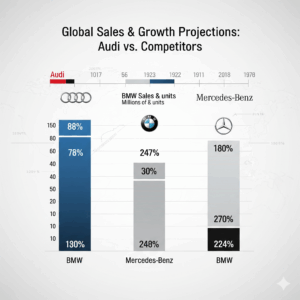Audi Considers Record 2 Million Car Sales Target
Volkswagen’s premium brand Audi is preparing a major strategic reset, setting its sights on a record 2 million car sales annually — a significant increase of nearly 20% compared to 2024 volumes. According to sources familiar with the matter, the new target may be revealed later this year as part of the company’s updated global strategy under CEO Gernot Doellner.
The goal, which has not been publicly confirmed by the carmaker, would mark the highest-ever sales level in Audi’s history. It also signals a more aggressive growth stance after years of stagnation and challenges that have caused the brand to lag behind rivals BMW and Mercedes-Benz.
Challenges Behind Audi’s New Strategy
Audi has faced repeated difficulties in recent years, including delays in launching new models, technology setbacks, and the impact of U.S. import tariffs. These issues widened the competitive gap between Audi and its luxury car peers.
For 2024, Audi reported sales of just 1.67 million cars, representing an 11.8% decline. Looking ahead, the company has set a target of 1.7–1.8 million sales in 2025. While these figures show modest growth, the long-term goal of 2 million units points to a renewed confidence in the brand’s trajectory.
U.S. Market Holds the Key
Much of Audi’s optimism is tied to the United States auto market, the second-largest globally after China. Unlike Europe, where demand has plateaued, the U.S. market is growing. Currently, Audi sells around 200,000 vehicles annually in the U.S., but executives believe this number could nearly double over time.
However, painful 27.5% U.S. import tariffs have created major obstacles. In the first half of 2025 alone, Audi lost approximately €600 million ($702 million) due to these duties. This has reignited discussions within Volkswagen Group about establishing a U.S. production site for Audi.
Industry observers suggest that Audi could either build its own factory or leverage Volkswagen’s existing production footprint. A decision is expected later this year, and any new facility would not only serve American buyers but also act as an export hub, following the successful models used by BMW and Mercedes-Benz in the U.S.
Global Trade and Tariff Developments
Tariff policy will play a pivotal role in Audi’s ability to expand in the U.S. Last week, Brussels initiated the legislative process to reduce tariffs on U.S. goods — a necessary step for Washington to lower EU auto import tariffs to 15% from 27.5%, effective retroactively from August 1. Whether or not the U.S. follows through remains uncertain, but such a move would significantly ease Audi’s burden in the market.
Strategic Revamp Under Doellner
Since taking over in 2023, CEO Gernot Doellner has made strategy reform a top priority. His leadership is now shaping Audi’s next chapter, with an emphasis on competitive positioning, production efficiency, and market diversification.
Doellner has stated that any U.S. plant would mirror the global footprint of Audi’s rivals, combining local market access with export advantages. This shift suggests that Audi is serious about closing its competitive gap and regaining momentum in the luxury car sector.
Outlook: Ambition Meets Reality
While the 2 million car sales target is ambitious, it reflects Audi’s recognition that the road to recovery requires bold moves. The brand has trailed behind competitors in both innovation and market share, but a revitalized U.S. strategy, tariff adjustments, and new production plans could lay the foundation for a turnaround.
If Audi can align execution with vision, the company could achieve its record goal in the coming years — positioning itself once again as a leading force in the premium car segment.
Discover more global business insights in IMPAAKT, the top business magazine.















